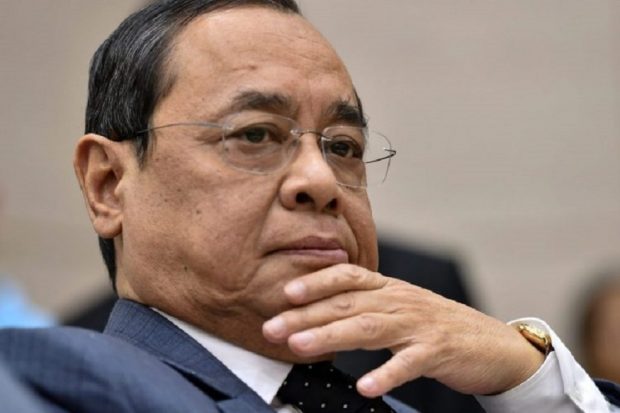
Process of in-house committee questionable in dealing with complaint against CJI: Ex-Delhi HC Chief Justice
PTI, Jul 29, 2019, 9:50 AM IST

New Delhi: Former chief justice of Delhi High Court A P Shah on Sunday termed as “questionable” the process followed by an in-house inquiry committee in dealing with sexual harassment allegations against Chief Justice of India (CJI) Ranjan Gogoi by a former woman employee of the Supreme Court.
“We need a robust mechanism so that future incidents are tackled differently and in a better way,” Justice (retd) Shah said while delivering the 27th Rosalind Wilson Memorial Lecture.
Shah said that the entire process was “shrouded in secrecy” in the name of protection of judicial independence. “Without passing judgment on the truth or falsity of the allegations, I must admit there are certain stark facts that stand out which demand consideration,” he said.
Justice Shah, who was speaking on the topic ‘Judging the judges – need for transparency and accountability’, noted that after the allegations against the CJI came to light, an “unusual hearing” took place on a Saturday in the apex court.
He was referring to the April 20 hearing in the apex court in which the CJI had described the allegations of sexual harassment against him as “unbelievable” and had said that a larger conspiracy was behind it.
“She made allegations of sexual harassment against the Chief Justice of India, in response to which there was an unusual hearing that took place on a Saturday without a petition having been moved. In what was termed as a ‘Matter of great public importance touching upon the independence of the judiciary’…,” Shah said.
“Three judges attended that hearing, but the order that emerged was surprisingly signed only by two out of those three, with the Chief Justice choosing to abstain,” he said.
Shah said that later the registrar general of the apex court had issued a public statement saying that the complaint was false. He said that a committee of judges was set up to look into the matter with the “judges being selected by the Chief Justice of India himself”.
“The process of inquiry was also questionable,” he said, adding that the complainant was not allowed to be represented by “lawyer” or “a next friend” and the in-house process was not explained to her. He said that the complainant withdrew from the case.
“The entire process was shrouded in secrecy in the name of the protection of judicial independence,” he said, adding, “All this demands a re-look at the accountability system for judges in India, and throws up many questions.”
He said that judicial independence is an “essential pillar” of liberty and rule of law. Shah said that Collegium system of appointment of judges to higher judiciary should go as decision for elevation of judges “tends to be arbitrary”.
“Decisions for elevations tend to be arbitrary; often names are bartered between members of the collegium. There is a complete lack of transparency, and perhaps names are even finalised over a cup of tea, as a judge of the Allahabad High Court said,” he said.
“It is the high time that this Collegium system, which is the most discredited system, should go,” he said, adding that the government should bring back the judicial appointment commissions with the “problematic clauses” being removed from it.
A five-judge Constitution bench of the apex court had on October 16, 2015 struck down the ambitious National Judicial Appointments Commission (NJAC) Act, 2014, leading to the revival of the collegium system of appointment of judges.
The NJAC Act 2014 would have accorded a major role to the executive in appointing judges to the higher judiciary. During the lecture, Justice (retd) Shah also answered a query regarding The Right to Information (Amendment) Bill, 2019 and said he was “extremely disturbed” with it.
He said that the whole idea behind it was to “dilute the provisions of the Act”. On July 25, Parliament approved the Bill amending the Act. It gave the government powers to decide salary and service terms of the statutory body head and its members
Udayavani is now on Telegram. Click here to join our channel and stay updated with the latest news.
Top News

Related Articles More

SC dismisses pleas seeking review of 2023 verdict declining legal sanction to same-sex marriage

NHRC notice to Centre, K’taka govt over ‘suicide’ by old man over hospital ‘denying’ scheme benefit

Modi govt has made GST a means of ‘looting’ poor, middle class: Kharge

India advocates ‘Budh’ over ‘Yudh’: PM Modi

NRAI to file complaint against Zomato, Swiggy over ‘pvt labelling’, food delivery via separate apps
MUST WATCH
Latest Additions

‘Surrender is betrayal’, says slain Naxal leader Vikram Gowda in audio!

‘Fake Marriage Deal’: Wife, brokers flee after scamming man of Rs. 4 Lakh

Vitla Bolanthoor Robbery Case: Investigation gains pace

Kerala youth arrested for Rs. 10L investment scam via WhatsApp

Editorial: Safety of devotees must be top priority at religious sites
Thanks for visiting Udayavani
You seem to have an Ad Blocker on.
To continue reading, please turn it off or whitelist Udayavani.





















